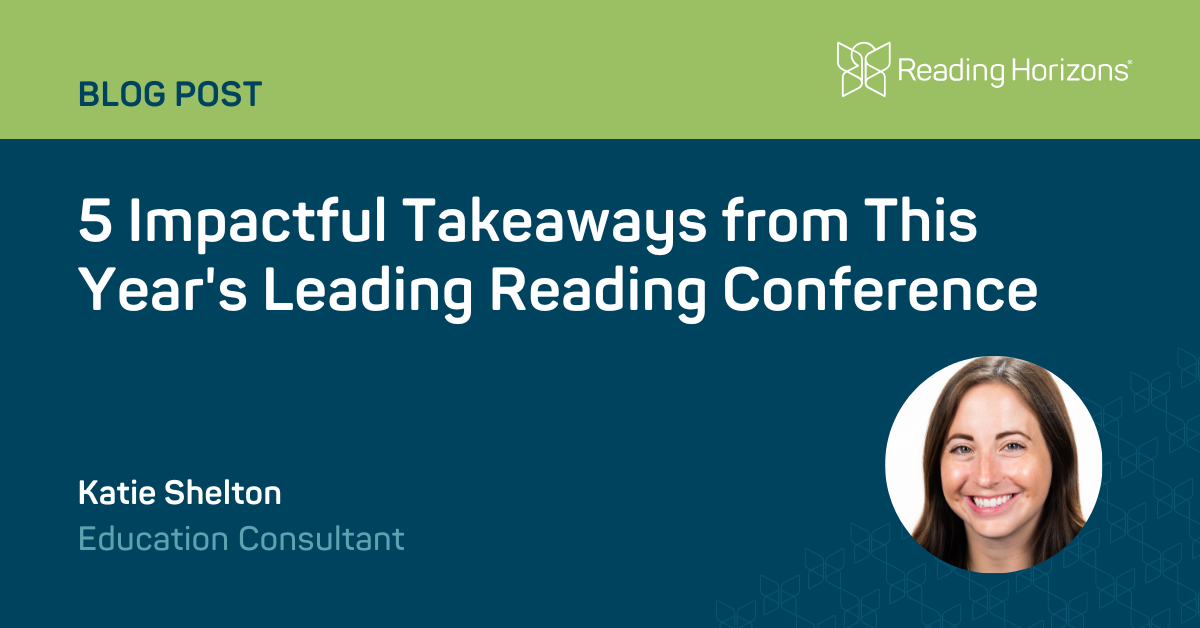
BY Katie Shelton, Education Consultant
Nerding out at the National Conference of The Reading League is always one of the highlights of my year. And this year’s eighth iteration, in Charlotte, NC, was no exception.
The conference—packed with literacy podcasters, respected researchers and authors, passionate educators, and science of reading advocates—was a perfect opportunity to connect, learn, and leave inspired.
Like many current and former educators (I taught third and fourth grade for ten years), I’m a lifelong learner. So, I’m sharing the top takeaways from my favorite sessions for those who couldn’t attend this year. Buckle up and hold on tightly to your bookends!
Heidi Beverine-Curry – RTI Revisited: Where Are We Now?
Dr. Heidi Beverine-Curry opened the conference by reframing Response to Intervention (RTI) as a response to the quality of instruction, not just intervention. She emphasized that everyone benefits from evidence-aligned teaching and that “unless we have solid core instruction, the whole system is going to be flawed.” She reinforced that when instruction doesn’t improve, neither does student achievement, and she called for everyone in the school—teachers, administrators, paraprofessionals, coaches, and interventionists—to be part of an RTI or MTSS model to drive meaningful progress.
Altheria Caldera, Maria Murray, and the Educators of Color Conference Community – All Means All: The Intersection of SoR and Culturally and Linguistically Responsive Literacy Instruction
This panel of experts highlighted the need for culturally and linguistically responsive approaches to literacy. Dr. Alexandra Babino discussed the importance of reducing stress for multilingual learners. She told the story of one of her students who came to her in tears, and when asked what was wrong, he replied, “It is too much English!” She advocated for a translanguaging approach to ease the cognitive load on students learning a new language, urging teachers to understand cross-linguistic similarities and differences. One teaching note that stuck with me is that when time is limited in a day, what do we always skip? The discussions and the written exit tickets. Don’t skip these things! This is helping MLLs to increase their language and writing skills.
Dr. Dionna Latimer-Hearn, who hosts the Respect the Dialect podcast, spoke about African American English (AAE). She made it clear that students who use AAE are not deficient or “at risk.” Teacher knowledge of AAE features is essential for effective instruction—understanding the rules of this dialect helps us connect more meaningfully with students. My favorite part was her reminder that “language variety is normal, natural, fun, and cool,” which beautifully summed up the session’s focus on celebrating linguistic diversity.
The Reading League Opening and Keynote by Zaretta Hammond – Leveraging the Science of Reading for Liberatory Education
Zaretta Hammond’s keynote centered on a powerful message, “Reading is the epicenter of equity.” She highlighted the importance of blending the science of reading with the science of learning to create strong implementations. She also emphasized building on students’ existing knowledge, or “schema,”—a process she described as “connecting the new to the known.” She encouraged nurturing a deep “word wealth” in students, emphasizing how a rich vocabulary allows for more nuanced thinking and expression. She also underscored the value of “productive struggle,” urging educators to balance “care and push” to guide students toward independence. When scaffolding, Hammond reminded us, it’s essential that support gradually fades; otherwise, it becomes a crutch rather than a bridge to confidence and competence.
Stephanie Stollar – Tier 1 Instruction Is Risk Reduction
This was one of the sessions I was most looking forward to, as I’ve followed Dr. Stollar’s work for quite some time—and she did not disappoint! This packed session was full of light bulb moments for me. Dr. Stollar reminded us that while Multi-Tiered Systems of Support (MTSS) aren’t new, we’ve strayed from some of their foundational principles. She posed a challenging question: If 60 percent of students in a grade lack essential skills, can we realistically intervene effectively with such a large group? Her answer was clear—it’s not feasible without strategic, high-quality Tier 1 instruction in the general education classroom. Classroom teachers are at the center, and Dr. Stollar advocated for school-wide planning of Tier 1 instruction to maximize support, allowing as many adults as possible to work with small groups in the general education classroom. Overcrowded intervention systems are less effective, which is why Tier 1 is the first focus.
A key takeaway was her approach to evaluating Tier 2 interventions. Dr. Stollar emphasized that we shouldn’t just monitor individual progress but assess the effectiveness of the entire Tier 2 system. Her words stood out to me: “If nobody is catching up as a result of your intervention, maybe that doesn’t mean you need to send more kids to Tier 3 or make a referral. Maybe that system of Tier 2 needs to be reanalyzed or changed in some way.” Intervention is most effective when it is in addition to, not instead of, instructional minutes every day directed at the student’s current skill level.
Ramona Pittman, Malatesha Joshi, and Emily Binks-Cantrell – Bridging the Science of Reading and African American Students’ Reading Success
This session, led by Ramona Pittman, explored the structure and impact of African American English (AAE) on reading success, emphasizing that AAE is a systematic, rule-governed language. The presenters highlighted how AAE influences areas like phonological awareness, spelling, vocabulary, and syntax. For example, in phonological awareness assessments, teachers should be mindful of dialectal variations rather than penalizing students—using these differences to inform instruction instead. By acknowledging where AAE phonology might differ from General American English, teachers can help students connect new sounds to familiar sounds.
Looking back on The 8th Annual Conference of The Reading League, I’m grateful for the chance to learn alongside so many incredible educators. When you are in the classroom, it’s easy to feel like you’re on your own. Being a part of The Reading League always reminds me that we’re all in this together, figuring out how to do better by our students every day. I hope these takeaways give you a spark of inspiration—something to try, reflect on, or even share with your team. At the end of the day, it’s all about moving the needle forward, little by little, for our students.
Watch Katie’s webinar—Myth Busting! 4 Misconceptions About Literacy Learning in Upper Grades

